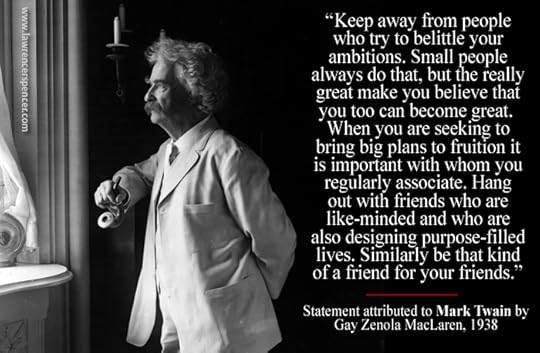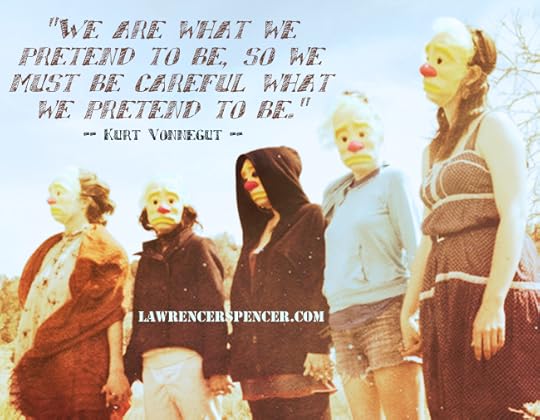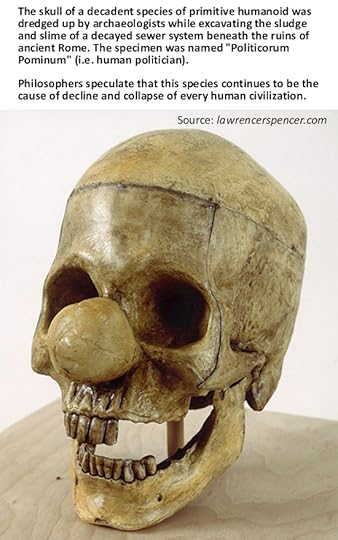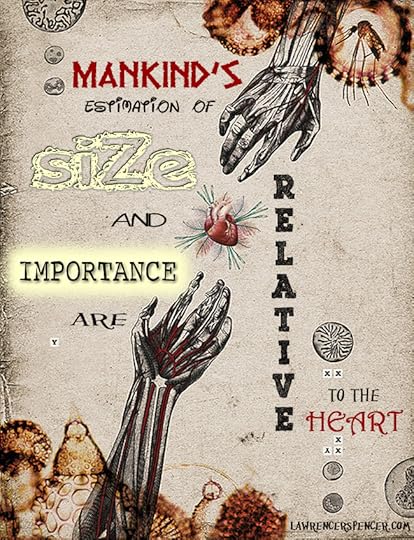Lawrence R. Spencer's Blog, page 379
October 31, 2017
CHARLES DICKENS AND WHY I LOVE AUDIO BOOKS
 This is my recent review of the audio book David Copperfield, written by Charles Dickens and performed by Mr. Simon Vance:
This is my recent review of the audio book David Copperfield, written by Charles Dickens and performed by Mr. Simon Vance:
“Charles Dickens defines the English language in application to the environs and inhabitants of his contemporary life with perfect eloquence and poignant emotion. David Copperfield, the novel, describes and embodies England and the English language at the pinnacle of its cultural power in the mid 1800s.
The narrative performance of this audio book by Mr. Simon Vance, of the myriad characterizations of persons and scenarios described or diverse diatribes of conversation conducted therein, cannot have been exceeded by the most eloquent thespian on any Shakespearean stage! Bravo, Bravo, Bravo Sir!
If you consider yourself a proponent of the English language this audio book is essential to sustaining your use of it and of expanding your appreciation of it mastery.
The delimitation of “rating” this book to “5 Stars” is a desecration of the monument and memory of Charles Dickens which shines eternally in The Heavens of Literature.”
You can download a copy of this book FREE HERE:
https://www.audible.com/pd/Classics/David-Copperfield-Audiobook/B002V8LEW2
from Wikipedia:
Charles John Huffam Dickens (7 February 1812 – 9 June 1870) was an English writer and social critic. He created some of the world’s best-known fictional characters and is regarded by many as the greatest novelist of the Victorian era.[1] His works enjoyed unprecedented popularity during his lifetime, and by the 20th century critics and scholars had recognised him as a literary genius. His novels and short stories enjoy lasting popularity.[2][3]
Born in Portsmouth, Dickens left school to work in a factory when his father was incarcerated in a debtors’ prison. Despite his lack of formal education, he edited a weekly journal for 20 years, wrote 15 novels, five novellas, hundreds of short stories and non-fiction articles, lectured and performed extensively, was an indefatigable letter writer, and campaigned vigorously for children’s rights, education, and other social reforms.
Dickens’s literary success began with the 1836 serial publication of The Pickwick Papers. Within a few years he had become an international literary celebrity, famous for his humour, satire, and keen observation of character and society. His novels, most published in monthly or weekly instalments, pioneered the serial publication of narrative fiction, which became the dominant Victorian mode for novel publication.[4][5] The instalment format allowed Dickens to evaluate his audience’s reaction, and he often modified his plot and character development based on such feedback.[5] For example, when his wife’s chiropodist expressed distress at the way Miss Mowcher in David Copperfield seemed to reflect her disabilities, Dickens improved the character with positive features.[6] His plots were carefully constructed, and he often wove elements from topical events into his narratives.[7] Masses of the illiterate poor chipped in ha’pennies to have each new monthly episode read to them, opening up and inspiring a new class of readers.[8]
Dickens was regarded as the literary colossus of his age.[9] His 1843 novella, A Christmas Carol, remains popular and continues to inspire adaptations in every artistic genre. Oliver Twist and Great Expectations are also frequently adapted, and, like many of his novels, evoke images of early Victorian London. His 1859 novel, A Tale of Two Cities, set in London and Paris, is his best-known work of historical fiction. Dickens has been praised by fellow writers—from Leo Tolstoy to George Orwell and G. K. Chesterton—for his realism, comedy, prose style, unique characterisations, and social criticism. On the other hand, Oscar Wilde, Henry James, and Virginia Woolf complained of a lack of psychological depth, loose writing, and a vein of saccharine sentimentalism. The term Dickensian is used to describe something that is reminiscent of Dickens and his writings, such as poor social conditions or comically repulsive characters.[10]
October 30, 2017
BECOME GREAT
October 29, 2017
DICHOTOMIES
 This universe is built on dichotomies: positive / negative, light / dark, good / bad, male / female, etc., However, you can create your own universe as easily as you can make your fingers move: WHAT YOU BELIEVE IS WHAT YOU PERCEIVE.
This universe is built on dichotomies: positive / negative, light / dark, good / bad, male / female, etc., However, you can create your own universe as easily as you can make your fingers move: WHAT YOU BELIEVE IS WHAT YOU PERCEIVE.
Originally posted 2012-06-06 00:12:54. Republished by Blog Post Promoter
October 28, 2017
BUBBLE BATH ROMANCE
[image error]
“The world will always welcome lovers….. As Time Goes By …..”. (click to play the song while you read the story)
A sad and sensuous melody wafts in from the Really Old Oldies Station playing on the radio in the bedroom. The classic melody melts into the candlelight and steam above my sunken penthouse bathtub hidden in the clouds of a Big City Skyline.
Amber tendrils of her dripping hair draw arabesques on golden skin along the supple curves of her torso. Eyes half-closed, pouting mouth, she tosses her head toward me with a gaze that would light wet firewood. There is nothing in the world but her and me.
Lifting a leg above the water, she rests her foot on my shoulder, stroking my hair and neck, tickling my ear with her pinkly painted toes. She makes me smile idiotically, yes, please-do-it-ically. I tilt my head to meet her foot with a submissive animal twitch that lets her know she’s my master.
Her leg bends slightly. A rivulet runs down her leg, melting into the canyon between her thighs. Her heel nestles next to my throat as she massages my temple with her toe. I lift my hand out of the suds to blow her a bubbly kiss. My eyes follow the ruffled waves as they ripple on the shores of her ample, island breasts. Tiny bubbles swirl and burst beneath her nipples like a tiny, iridescent fireworks show.
Slowly her caresses shift, her slick skin slithers on mine, the tip of her toe traces my chin, the contour of my lips. My eyes loose focus as I submerge myself in sensuousness. I nibble at her perfect toes, tickling with my tongue. She giggles, then laughs out loud. That sound! If it was food, I’d gain a hundred pounds!
“Oh, baby…” My voice is a horse whisper. She whinnies and lets her arching foot slide down my pecs. Her toes dig into my skin, her sole rests on the wild pounding in my chest — she can feel it! Very still, she listens to my heart with her delicious toes. It’s pumping! Out of control, like some menacing machine! We both know where the blood is going now…Shadow, I love you.
She bites her lower lip. Her breathing quickens. Like a female Captain Ahab, she lowers her boat urgently into the bubble bath scented waves to hunt for the great, white sperm whale.
“Oh yeah, baby. Lower away!”, I say, urging her on.
As the keel of Shadow’s boat rides on the waves of our passion, I hear, in the back of my mind, the voice of Gregory Peck intoning Herman Melville’s immortal words:
“The whale, the whale! Up helm, up helm! Oh, all ye sweet powers of air, now hug me close! Steady! helmsman, steady. Nay, nay! Up helm again! He turns to meet us! Oh, his unappeasable brow drives on towards one, whose duty tells him he cannot depart. My God, stand by me now!”
The perfumed waves mount into a frothing tempest and splash onto the bathroom floor. My Moby Dick rams and hoists the shuddering bow of her sensuous ship until her timbers creak and moan, and then explode, giving way to screams!…the same, impassioned screams that have summoned the wandering souls of humanity into the next generation of baby bodies since the Omniscient Creator orchestrated the first primordial conception of homo sapiens in the dim mists of…
“Bbrrrrriiiing! Bbrrrrriiiing!”
I opened one eye slowly and carefully lurched my aching head up off my desk. Oh, (Bleep)! I was dreaming again! A very moist dream. For the third time this week I’d fallen asleep in front of my computer monitor. I felt like “Johnny Dollar, PI”, in the old radio program I used to listen to when I was a kid, except for the fact that he had an expense account because he worked as a claims investigator for some big insurance company.
I have a lot of expenses, but I didn’t have any accounts. Every time Johnny walked around a corner somebody hit him on the back of the head and knocked him out. He spent all of his time trying to figure out who did it and why. Usually, it was because of some women he was mixed up with. You think he would have learned to stay away from corners.
“Bbrrrrriiiing! Bbrrrrriiiing!”
The (bleeping) phone was still ringing! My answering machine picked up the call. I heard my cleverly conceived marketing message start to play as I looked foggily at the sign painted on the opaque glass of my office door:
The Un-existential Detective Agency of America (T.U.D.A.A.) !
“We dig up the truth for you”
SAM SHOVEL – Proprietor and Public Dick”
____________________________
Excerpt from Chapter One of THE BIG BLEEP, a novel by Lawrence R. Spencer
Originally posted 2011-01-01 20:41:48. Republished by Blog Post Promoter
October 27, 2017
YOU ARE WHAT YOU PRETEND TO BE
“We are what we pretend to be, so we must be careful what we pretend to be.”
— Kurt Vonnegut
Kurt Vonnegut, Jr., November 11, 1922 – April 11, 2007) was a 20th-century American writer.[2] His works such as Cat’s Cradle (1963), Slaughterhouse-Five (1969), and Breakfast of Champions (1973) blend satire, gallows humor, and science fiction. As a citizen he was a lifelong supporter of the American Civil Liberties Union and a critical leftist intellectual.[3] He was known for his humanist beliefs and was honorary president of the American Humanist Association.
Vonnegut’s first short story, “Report on the Barnhouse Effect”[34] appeared in the February 11, 1950 edition of Collier’s (it has since been reprinted in his short story collection, Welcome to the Monkey House). His first novel was the dystopian novel Player Piano (1952), in which human workers have been largely replaced by machines. He continued to write short stories before his second novel, The Sirens of Titan, was published in 1959.[35] Through the 1960s, the form of his work changed, from the relatively orthodox structure of Cat’s Cradle (which in 1971 earned him a Master’s Degree) to the acclaimed, semi-autobiographical Slaughterhouse-Five, given a more experimental structure by using time travel as a plot device. These structural experiments were continued in Breakfast of Champions (1973), which includes many rough illustrations, lengthy non-sequiturs and an appearance by the author himself, as a deus ex machina.
Vonnegut attempted suicide in 1984 and later wrote about this in several essays.[36]
Breakfast of Champions became one of his best-selling novels. It includes, in addition to the author himself, several of Vonnegut’s recurring characters. One of them, science fiction author Kilgore Trout, plays a major role and interacts with the author’s character.
In 1974, Venus on the Half-Shell, a book by Philip José Farmer in a style similar to that of Vonnegut and attributed to Kilgore Trout, was published. This caused some confusion among readers, as for some time many assumed that Vonnegut wrote it; when the truth of its authorship came out, Vonnegut was reported as being “not amused”. In an issue of the semi-prozine The Alien Critic/Science Fiction Review, published by Richard E. Geis, Farmer claimed to have received an angry, obscenity-laden telephone call from Vonnegut about it.
In addition to recurring characters, there are also recurring themes and ideas. One of them is ice-nine (a central wampeter in his novel Cat’s Cradle).
Although many of his novels involved science fiction themes, they were widely read and reviewed outside the field, not least due to their anti-authoritarianism. For example, in his seminal short story “Harrison Bergeron” egalitarianism is rigidly enforced by overbearing state authority, engendering horrific repression.
In much of his work, Vonnegut’s own voice is apparent, often filtered through the character of science fiction author Kilgore Trout (whose name is based on that of real-life science fiction writer Theodore Sturgeon). It is characterized by wild leaps of imagination and a deep cynicism, tempered by humanism. In the foreword to Breakfast of Champions, Vonnegut wrote that as a child, he saw men with locomotor ataxia, and it struck him that these men walked like broken machines; it followed that healthy people were working machines, suggesting that humans are helpless prisoners of determinism. Vonnegut also explored this theme in Slaughterhouse-Five, in which protagonist Billy Pilgrim “has come unstuck in time” and has so little control over his own life that he cannot even predict which part of it he will be living through from minute to minute. Vonnegut’s well-known phrase “So it goes”, used ironically in reference to death, also originated in Slaughterhouse-Five. “Its combination of simplicity, irony, and rue is very much in the Vonnegut vein.”[32]
With the publication of his novel Timequake in 1997, Vonnegut announced his retirement from writing fiction. He continued to write for the magazine In These Times, where he was a senior editor,[37] until his death in 2007, focusing on subjects ranging from contemporary U. S. politics to simple observational pieces on topics such as a trip to the post office. In 2005, many of his essays were collected in a new bestselling book titled A Man Without a Country, which he insisted would be his last contribution to letters.[38]
An August 2006 article reported:
He has stalled finishing his highly anticipated novel If God Were Alive Today — or so he claims. “I’ve given up on it… It won’t happen… The Army kept me on because I could type, so I was typing other people’s discharges and stuff. And my feeling was, ‘Please, I’ve done everything I was supposed to do. Can I go home now?’ That’s what I feel right now. I’ve written books. Lots of them. Please, I’ve done everything I’m supposed to do. Can I go home now?”
Originally posted 2012-10-22 01:18:18. Republished by Blog Post Promoter
October 26, 2017
PRIMITIVE HUMANOID SKULL – Politicorum Pominum
October 25, 2017
COFFEE ART
SIZE AND IMPORTANCE
MANKIND’S ESTIMATION OF SIZE AND IMPORTANCE ARE RELATIVE TO THE HEART
Originally posted 2012-08-20 02:47:04. Republished by Blog Post Promoter
October 24, 2017
THE MAZE
“IN MAZES OF IMAGININGS
ALL SENTIENT BEINGS DREAM
‘I AM THE WHO WHO’S THINKING’
THE ILLUSIONS THAT I SEE.
WE CAN ESCAPE MORTALITY:
DELUSIONS WE’VE BEEN TOLD.
WE’RE LIVING THROUGH ETERNITY
AS IMMORTAL SOULS.”
__________________
Lawrence R. Spencer. 2013.
Originally posted 2013-07-13 17:41:31. Republished by Blog Post Promoter











